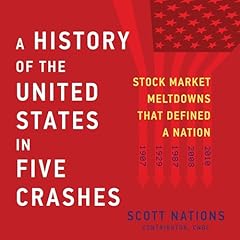
After the Music Stopped
The Financial Crisis, the Response, and the Work Ahead
No se pudo agregar al carrito
Add to Cart failed.
Error al Agregar a Lista de Deseos.
Error al eliminar de la lista de deseos.
Error al añadir a tu biblioteca
Error al seguir el podcast
Error al dejar de seguir el podcast
 Exclusivo para miembros Prime: ¿Nuevo en Audible? Obtén 2 audiolibros gratis con tu prueba.
Exclusivo para miembros Prime: ¿Nuevo en Audible? Obtén 2 audiolibros gratis con tu prueba.Compra ahora por $23.44
-
Narrado por:
-
Graham Vick
-
De:
-
Alan S. Blinder
Named one of the 10 best books of 2013 by Michiko Kakutani and the New York Times Book Review
Alan S. Blinder - esteemed Princeton professor, Wall Street Journal columnist, and former vice chairman of the Federal Reserve Board under Alan Greenspan - is one of our wisest and most clear-eyed economic thinkers. In After the Music Stopped, he delivers a masterful narrative of how the worst economic crisis in postwar American history happened, what the government did to fight it, and what we must do to recover from it. With bracing clarity, Blinder chronicles the perfect storm of events beginning in 2007, from the bursting of the housing bubble to the implosion of the bond bubble, and how events in the U.S. spread throughout the interconnected global economy. Truly comprehensive and eminently listenable, After the Music Stopped is the essential book about the financial crisis.
©2013 Alan S. Blinder (P)2013 Audible Inc.Los oyentes también disfrutaron:




















Reseñas de la Crítica
Las personas que vieron esto también vieron:















Great summary of the financial crisis and response
Se ha producido un error. Vuelve a intentarlo dentro de unos minutos.
Would you listen to After the Music Stopped again? Why?
Yes I plan on listening to it again because the topic is complex and Blinder's analysis of the causes and remedies are not yet fully implemented.Who was your favorite character and why?
This isn't a story focused on characters. It is about a crisis, ideas of solutions, and decisions. The favorite idea is about the way to help people with their mortgages. That is because it was not addressed by the decision makers during the crisis.What about Graham Vick’s performance did you like?
He has a very appealing voice.If you were to make a film of this book, what would the tag line be?
This is not a drama, it is an excellent analysis.Any additional comments?
This book is better than Elizabeth Warren's book or Tim Geithner's book because it is not written as a personal memoir. It is an objective analysis from one of the very few people smart enough and familiar enough to get it right.Better than the others
Se ha producido un error. Vuelve a intentarlo dentro de unos minutos.
The narrator was excellent. The book is written in a somewhat folksy style and Graham Vick captured the tone perfectly.
One of the best books on the Financial Crisis
Se ha producido un error. Vuelve a intentarlo dentro de unos minutos.
No Love for Those Who Successfully Avert Disaster
Se ha producido un error. Vuelve a intentarlo dentro de unos minutos.
Best book on the crisis
Se ha producido un error. Vuelve a intentarlo dentro de unos minutos.


